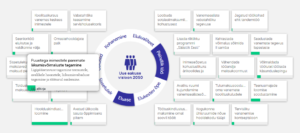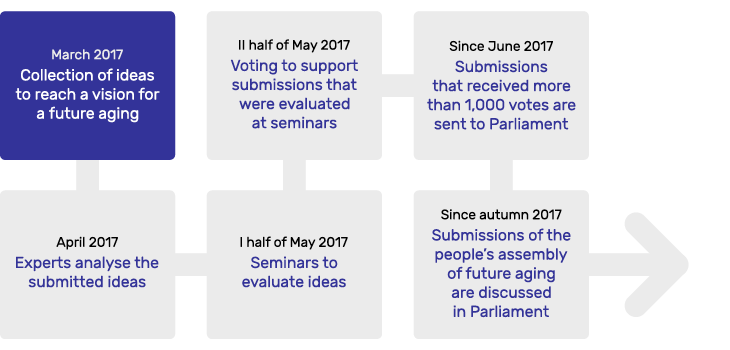People’s Assembly on Future of Ageing in 2017
The People’s Assembly on the Future of Ageing was a deliberative process for popularizing the expert-made Vision for Future Ageing 2050 and getting new ideas for reforming the pension system of Estonia. The goal of the People’s Assembly was to gather ideas on what the state could possibly do, so that the elderly age in 2050 would be more active and happy than it is today. The Assembly was launched in March 2017 and the active phase ended with 2017, although many of the collective proposals are still gathering support signatures in order to reach the Parliament.
The Estonian Cooperation Assembly, the coordinator of the People’s Assembly, launched a two-year programme Pension 2050 to lead the public discussion on the future of ageing. In parallel with the program, Estonian Government was preparing a pension reform, according to which the age of retirement will increase together with estimated life expectancy, and the flexibility in choosing the size of your pension and your retirement age will increase too. Still, a broader view to the future was needed, which is why the experts in the field compiled the Vision of Future Ageing 2050.
Vision of the future ageing 2050
Current situation
People hope that their income during retirement will be 70-90% of their salary. However, the national pension system cannot provide more than 35-40 percent in the future.
In Estonia among the population aged 65 and older 18% of people are actively employed. Their total average income exceeds 900 euros, while the pension of non-working people of the same age is 356 euros.
Less than 5% of people aged 55 years or older take part in lifetime learning. As people will need to work longer in the future, the labour market will change in the coming decades so much so that people’s skills, experiences and health won’t allow them to work until the planned age.
If the state increases the retirement age, a pension in today’s value will be similar to the current amount, which is about 400 euros. If the pension system doesn’t change, the old-age pension will decrease to 280 euros by 2050 from the figure of 360 euros in 2015.
The new old age in 2050 could look like this:
- The quality of life of an older person could depend on a person’s individual choices, not on the state;
- 60% of 70-year-olds could work full or part time;
- the share of people participating in lifelong learning could no longer depend on age;
- the income of non-working older people could be 70% of their previous income, while the share of the national pension could significantly decrease;
- frail old people could choose to live in a common house or community, care home or at home, because care expenses are covered;
- elderly people could have diverse skills; they could do different kinds of jobs and study at the same time;
- people could be informed about getting older, about what to expect and they could cope better.
The people’s assembly of future ageing was looking for ideas on how people could work, learn and live as long and as happily as possible in the future. The people´s assembly focussed on solutions that are required at a national level. The citizen assembly topics were:
- Insurance or how to provide a decent income for older people into the future?
- Self-realisation or how to ensure that people have the opportunity to learn and work until old age?
- Health or how to ensure that people will not leave the labour market due to health problems?
- Adaption or what is required to make the pension system changes simple and understandable for everyone?
Within three weeks (March-April 2017) 80 ideas were submitted on these four subjects. Close to 20 experts evaluated the applicability of these ideas, in addition to interested parties and the authors of these ideas themselves at three thematic seminars (May 2017). As a result of these analyses and conversations 26 ideas were voted as nationally solvable and with possible positive impacts. The selected ideas were inserted to uuseakus.rahvaalgatus.ee, the iteration of the citizen initiative platform rahvaalgatus.ee, to collect 1000 support signatures needed for sending each idea to parliamentary discussions. (Therefore the usual random sample of participants was replaced with the existing citizen right to collectively address the parliament.)
The majority of these 26 ideas are still awaiting supporting signatures. Two suggestions – creating care insurance and a more flexible system of compulsory funded pension payments – had gathered so many signatures by the end of 2017 that they will be discussed at Riigikogu.

26 ideas on uuseakus.rahvaalgatus.ee
The greatest value of the People’s Assembly on the Future of Ageing is the revival of people’s assemblies as a co-creation method, binding new suggestions on ageing with collective referrals sent to the parliament and connecting Riigikogu more closely with participatory democracy processes.
By the end of 2017, it was too early to evaluate the success of the People’s Assembly on the Future of Ageing, but according to what was summarized at the Seminar of the People’s Assembly on the Future of Ageing (held on 16th November 2017), the most important results were:
- revival of the People’s Assembly method first experimented in Estonia back in 2013 (read about Rahvakogu);
- introducing a new way of holding public discussion about pension system by gathering a large amount of ideas and collective proposals on how to reach the Vision of Future Ageing;
- producing collective freeware: the collected ideas together with their short impact assessments as well as the Vision for Future Ageing is public and to be cited and used by anyone interested;
- spreading of experimental culture: introducing a new, deliberative way of collecting proposals for solving societal problems;
- a strong partnership between the responsible ministries and experts involved in the assembly was formed around such an unattractive and politically sensitive topic like the pension system reform, helping the ministries to continue with the reform;
- continuing discussions on issues around elderlyhood at the Estonian Parliament.
If you want to know more, please write info@kogu.ee
Updated in June 2018

